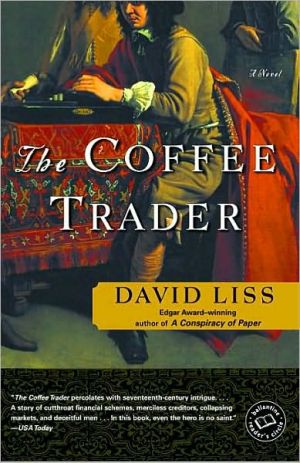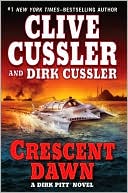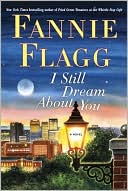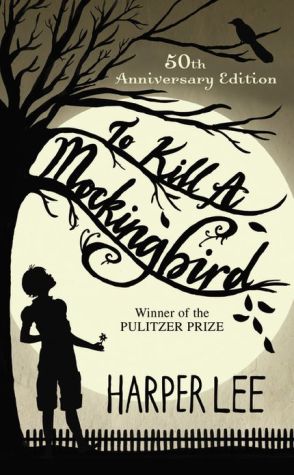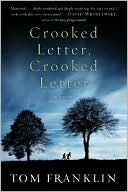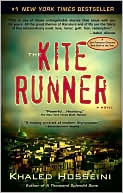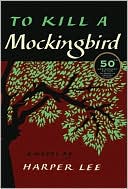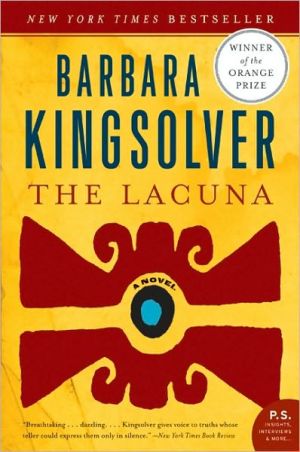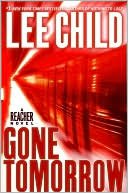The Coffee Trader
Amsterdam, 1659: On the world’s first commodities exchange, fortunes are won and lost in an instant. Miguel Lienzo, a sharp-witted trader in the city’s close-knit community of Portuguese Jews, knows this only too well. Once among the city’s most envied merchants, Miguel has suddenly lost everything. Now, impoverished and humiliated, living in his younger brother’s canal-flooded basement, Miguel must find a way to restore his wealth and reputation.\ Miguel enters into a partnership with a...
Search in google:
Amsterdam, 1659: On the world’s first commodities exchange, fortunes are won and lost in an instant. Miguel Lienzo, a sharp-witted trader in the city’s close-knit community of Portuguese Jews, knows this only too well. Once among the city’s most envied merchants, Miguel has suddenly lost everything. Now, impoverished and humiliated, living in his younger brother’s canal-flooded basement, Miguel must find a way to restore his wealth and reputation.Miguel enters into a partnership with a seductive Dutchwoman who offers him one last chance at success—a daring plot to corner the market of an astonishing new commodity called “coffee.” To succeed, Miguel must risk everything he values and face a powerful enemy who will stop at nothing to see him ruined. Miguel will learn that among Amsterdam’s ruthless businessmen, betrayal lurks everywhere, and even friends hide secret agendas.The Washington PostThat sense of characters being subject to forces they cannot master is, in fact, the great strength of The Coffee Trader, as it was of A Conspiracy of Paper. Liss's novels are ultimately about a central truth of capitalism, which is that the system is bigger and more powerful than anyone within it. Sometimes that works to a trader's advantage, as he reaps an unplanned windfall, and sometimes it destroys him. In either case, whatever security he has is tenuous. The best moments of The Coffee Trader create a powerful sense of vertigo that's something like the vertigo of finance capitalism, where is there no end to the trading and no firm foundation, just an ever-receding spiral of value. — James Surowiecki
Chapter 1\ It rippled thickly in the bowl, dark and hot and uninviting. Miguel Lienzo picked it up and pulled it so close he almost dipped his nose into the tarry liquid. Holding the vessel still for an instant, he breathed in, pulling the scent deep into his lungs. The sharp odor of earth and rank leaves surprised him; it was like something an apothecary might keep in a chipped porcelain jar.\ “What is this?” Miguel asked, working through his irritation by pushing at the cuticle of one thumb with the nail of the other. She knew he had no time to waste, so why had she brought him here for this nonsense? One bitter remark after another bubbled up inside him, but Miguel let loose with none of them. It wasn’t that he was afraid of her, but he often found himself going to great lengths to avoid her displeasure.\ He looked over and saw that Geertruid met his silent cuticle mutilation with a grin. He knew that irresistible smile and what it meant: she was mightily pleased with herself, and when she looked that way it was hard for Miguel not to be mightily pleased with her too.\ “It’s something extraordinary,” she told him, gesturing toward his bowl.\ “Drink it.”\ “Drink it?” Miguel squinted into the blackness. “It looks like the devil’s piss, which would certainly be extraordinary, but I’ve no desire to know what it tastes like.”\ Geertruid leaned toward him, almost brushing up against his arm. “Take a sip and then I’ll tell you everything. This devil’s piss is going to make both our fortunes.”\ It had begun not an hour earlier, when Miguel felt someone take hold of his arm.\ In the instant before he turned his head, he ticked off the unpleasant possibilities: rival or creditor, an abandoned lover or her angry relative, the Danish fellow to whom he’d sold those Baltic grain futures with too enthusiastic a recommendation. Not so long ago the approach of a stranger had held promise. Merchants and schemers and women had all sought Miguel’s company, asking his advice, craving his companionship,\ bargaining for his guilders. Now he wished only to learn in what new shape disaster would unfold itself.\ He never thought to stop walking. He was part of the procession that formed each day when the bells of the Nieuwe Kerk struck two, signaling the end of trading on the Exchange. Hundreds of brokers poured out onto the Dam, the great plaza at Amsterdam’s center. They spread out along the alleys and roads and canal sides. Along the Warmoesstraat, the fastest route to the most popular taverns, shopkeepers stepped outside,\ donning wide-brimmed leather hats to guard against damp that rolled in from the Zuiderzee. They set out sacks of spices, rolls of linen,\ barrels of tobacco. Tailors and shoemakers and milliners waved men inside; sellers of books and pens and exotic trinkets cried out their wares.\ The Warmoesstraat became a current of black hats and black suits,\ speckled only with the white of collars, sleeves, and stockings or the flash of silver shoe buckles. Traders pushed past goods from the Orient or the New World, from places of which no one had heard a hundred years before. Excited like schoolboys set free of the classroom, the traders talked of their business in a dozen different languages. They laughed and shouted and pointed; they grabbed at anything young and female that crossed their path. They took out their purses and devoured the shopkeepers’ goods, leaving only coins in their wake.\ Miguel Lienzo neither laughed nor admired the commodities set out before him nor clutched at the soft parts of willing shop girls. He walked silently, head down against the light rain. Today was, on the Christian calendar, the thirteenth day of May, 1659. Accounts on the Exchange closed each month on the twentieth; let a man make what maneuvers he liked, none of it mattered until the twentieth, when the credits and debits of the month were tallied and money at last changed hands. Today things had gone badly with a matter of brandy futures, and Miguel now had less than a week to pluck his fat from the fire or he would find himself another thousand guilders in debt.\ Another thousand. He already owed three thousand. Once he had made double that in a year, but six months ago the sugar market collapsed,\ taking Miguel’s fortune with it. And then–well, one mistake after another. He wanted to be like the Dutch, who regarded bankruptcy as no shame. He tried to tell himself it did not matter, it was only a little while longer until he undid the damage, but believing that tale required an increasing effort. How long, he wondered, until his wide and boyish face turned pinched? How long until his eyes lost the eager sparkle of a merchant and took on the desperate, hollow gaze of a gambler? He vowed it would not happen to him. He would not become one of those lost souls,\ the ghosts who haunted the Exchange, living from one reckoning day to the next, toiling to secure just enough profit to keep their accounts afloat for one more month when surely all would be made easy.\ Now, with unknown fingers wrapped around his arm, Miguel turned and saw a neatly dressed Dutchman of the middling ranks, hardly more than twenty years of age. He was a muscular wide-shouldered fellow with blond hair and a face almost more pretty than handsome, though his drooping mustache added a masculine flair.\ Hendrick. No family name that anyone had ever heard. Geertruid Damhuis’s fellow.\ “Greetings, Jew Man,” he said, still holding on to Miguel’s arm. “I hope all goes well for you this afternoon.”\ “Things always go well with me,” he answered, as he twisted his neck to see if any prattling troublemaker might lurk behind him. The Ma’amad,\ the ruling council among the Portuguese Jews, forbade congress between Jews and “inappropriate” gentiles, and while this designation could prove treacherously ambiguous, no one could mistake Hendrick, in his yellow jerkin and red breeches, for anything appropriate.\ “Madam Damhuis sent me to fetch you,” he said.\ Geertruid had played at this before. She knew Miguel could not risk being seen on so public a street as the Warmoesstraat with a Dutchwoman,\ particularly a Dutchwoman with whom he did business, so she sent her man instead. There was no less risk to Miguel’s reputation, but this way she could force his hand without even showing her face.\ “Tell her I haven’t the time for so lovely a diversion,” he said. “Not just now.”\ “Of course you do.” Hendrick grinned widely. “What man can say no to Madam Damhuis?”\ Not Miguel. At least not easily. He had difficulty saying no to Geertruid or to anyone else–including himself–who proposed something amusing. Miguel had no stomach for doom; disaster felt to him like an awkward and loose suit. He had to force himself each day to play the cautious role of a man in the throes of ruin. That, he knew, was his true curse, the curse of all former Conversos: in Portugal he had grown too used to falseness, pretending to worship as a Catholic, pretending to despise Jews and respect the Inquisition. He had thought nothing of being one thing while making the world believe he was another.\ Deception, even self-deception, came far too easily.\ “Thank your mistress but give her my regrets.” With reckoning day soon upon him, and new debts to burden him, he would have to curb his diversions, at least for a while. And there had been another note this morning, a strange anonymous scrawl on a torn piece of paper. I want my money. It was one of a half dozen or so Miguel had received in the last month. I want my money. Wait your turn, Miguel would think glumly, as he opened each of these letters, but he was unnerved by the terse tone and uneven hand. Only a madman would send such a message without a name–for how could Miguel respond even if he had the money and even if he were inclined to use what little he had for something so foolish as paying debts?\ Hendrick stared, as though he couldn’t understand Miguel’s good, if thickly accented, Dutch.\ “Today is not the day,” Miguel said, a bit more forcefully. He avoided speaking too adamantly to Hendrick, whom he had once seen slam a butcher’s head into the stones of the Damplatz for selling Geertruid rancid bacon.\ Hendrick gazed at Miguel with the special pity men of the middle rank reserved for their superiors. “Madam Damhuis told me to inform you that today is the day. She tells me that she will show you something, and when you set your eyes on it, you will forever after divide your life into the time before this afternoon and the time after.”\ The thought of her disrobing flashed before him. That would be a lovely divide between the past and the future and would certainly be worth setting aside his business for the afternoon. However, Geertruid loved to play at these games. There was little chance she meant to take off as much as her cap. But there was no getting rid of Hendrick, and urgent as his troubles might be, Miguel could make no deals with this Dutchman lurking in his shadow. It had happened before. He would trail Miguel from tavern to tavern, from alley to canal side, until Miguel surrendered. Best to have this over with, he decided, so he sighed and said he would go.\ With a sharp gesture of his neck, Hendrick led them off the ancient cobbled street and across the steep bridges toward the new part of the city, ringed by the three great canals–the Herengracht, the Keizersgracht, and the Prinsengracht–and then toward the Jordaan, the most rapidly growing part of town, where the air echoed with the ring of hammer on anvil and the chipping of chisel on stone.\ Hendrick led him along the waters of the Rozengracht, where barges pierced the thick canal mist as they headed toward the docks to unload their goods. The new houses of the newly wealthy stood on either side of the murky water, facing the oak- and linden-lined waterway. Miguel had once rented the better part of so fine a house, red-brick and steeple-gabled. But then Brazilian production of sugar had far exceeded Miguel’s expectations. He’d been gambling on low production for years,\ but suddenly Brazilian farmers unleashed an unexpected crop, and in an instant prices collapsed. A great man of the Exchange as instantly became a debtor living off his brother’s scraps.\ Once they departed from the main street, the Jordaan lost its charm. The neighborhood was new–where they stood had been farmland only thirty years before–but already the alleyways had taken on the decrepit cast of a slum. Dirt replaced the cobblestones. Huts made of thatch and scraps of wood leaned against squat houses black with tar. The alleys vibrated with the hollow clacking of looms, as weavers spun from sunup until late into the night, all in the hope of earning enough to keep their bellies full for one more day.\ In moments of weakness, Miguel feared that poverty would claim him as it had claimed the wretched of the Jordaan, that he would fall into a well of debt so deep he would lose even the dream of recovering himself.\ Would he be the same man then–himself, yet penniless–or would he become as hollow as the beggars and luckless laborers he passed on the streets?\ He assured himself it would not happen. A true merchant never gives in to gloom. A man who has lived as a Secret Jew always has one more trick to save his skin. At least until he fell into the clutches of the Inquisition, he reminded himself, and there was no Inquisition in Amsterdam. Just the Ma’amad.\ But what was he doing here with this inscrutable Dutchman? Why had he allowed his will to collapse when he had business, important business,\ to pursue?\ “To what sort of place are you taking me?” Miguel asked, hoping to find a reason to excuse himself.\ “A miserable sort of place,” Hendrick said.\ Miguel opened his mouth to voice an objection, but it was too late. They had arrived.\ Though he was not, like the Dutch, inclined to believe in omens, Miguel would later recall that his venture had begun in a place called the Golden Calf, surely an unpromising name. They climbed down a steep and viciously low-ceilinged stairwell to the cellar, a little room that might comfortably have held thirty souls but now contained perhaps fifty. The choking smoke of cheap West Indian tobacco and musty peat stoves nearly suppressed the scent of spilled beer and wine, old cheese,\ and the odor of fifty unwashed men–or, rather, forty men and ten whores–whose mouths puffed out onions and beer.\ At the bottom of the stairs, an enormous man, shaped remarkably liked a pear, blocked their passage, and sensing that someone wished to get by he moved his bulk backwards to prevent anyone from squeezing past. He held a tankard in one hand and a pipe in the other, and he shouted something incomprehensible to his companions.\ “Move your monstrous bulk, fellow,” Hendrick said to him.\ The man turned his head just enough to register his scowl and then looked away.\ “Fellow”–Hendrick tried again–“you are the hard turd in the ass of my journey. Don’t make me apply a purgative to flush you out.”\ “Go piss in your breeches,” he answered, and then belched laughter in his friends’ faces.\ “Fellow,” said Hendrick, “turn around and see to whom you speak so rudely.”\ The man did turn around, and as he saw Hendrick the grin melted from his jowly three-days-unshaved face. “Begging your pardon,” he said. He pulled his cap down off his head and moved quickly out of the way,\ knocking clumsily into his friends.\ This newfound humility wasn’t enough to satisfy Hendrick, who reached out like the lash of a whip and grabbed the man’s filthy shirt. The tankard and pipe fell to the floor. “Tell me,” Hendrick said, “should I crush your throat or not crush your throat?”\ “Not crush,” the drunk suggested eagerly. His hands flapped like bird wings.\ “What do you say, Jew Man?” Hendrick asked Miguel. “Crush or not crush?”\ “Oh, let him go,” Miguel answered wearily.\ Hendrick released his grip. “The Jew Man says to let you go. You remember that, fellow, next time you think to toss a dead fish or rotten cabbage at a Jew. A Jew has saved your hide today, and for no good reason, too.” He turned to Miguel. “This way.”
\ The Washington PostThat sense of characters being subject to forces they cannot master is, in fact, the great strength of The Coffee Trader, as it was of A Conspiracy of Paper. Liss's novels are ultimately about a central truth of capitalism, which is that the system is bigger and more powerful than anyone within it. Sometimes that works to a trader's advantage, as he reaps an unplanned windfall, and sometimes it destroys him. In either case, whatever security he has is tenuous. The best moments of The Coffee Trader create a powerful sense of vertigo that's something like the vertigo of finance capitalism, where is there no end to the trading and no firm foundation, just an ever-receding spiral of value. — James Surowiecki\ \ \ \ \ Penelope MesicLike his successful debut, A Conspiracy of Paper, Liss's new book is historical fiction that follows the ins and outs of commerce, this time in the Jewish community of seventeenth-century Amsterdam. Well-plotted and solidly researched, the book is able but ponderous, written in a style that avoids anachronisms but never seems quite colloquial. Miguel Lienzo, driven out of Portugal by the Inquisition, has already made and lost a fortune. He now seeks to recoup his losses by secretly trading in a bitter but stimulating new drink. Treacherous moneylenders and fellow traders, including his own envious brother, must be outwitted and creditors must be sidestepped, all in a swirl of secret meetings and falsely labeled cargoes. Like many a modern trader, Miguel has the ingenuity and vitality of a man who never knows, when he leaves for work, whether he will be a mogul or a pauper when he comes home.\ \ \ Publishers WeeklyLiss's first novel, A Conspiracy of Paper, was sketched on the wide canvas of 18th-century London's multilayered society. This one, in contrast, is set in the confined world of 17th-century Amsterdam's immigrant Jewish community. Liss makes up the difference in scale with ease, establishing suspense early on. Miguel Lienzo escaped the Inquisition in Portugal and lives by his wits trading commodities. He honed his skills in deception during years of hiding his Jewish identity in Portugal, so he finds it easy to engage in the evasions and bluffs necessary for a trader on Amsterdam's stock exchange. While he wants to retain his standing in the Jewish community, he finds it increasingly difficult to abide by the draconian dictates of the Ma'amad, the ruling council. Which is all the more reason not to acknowledge his longing for his brother's wife, with whom he now lives, having lost all his money in the sugar trade. Miguel is delighted when a sexy Dutch widow enlists him as partner in a secret scheme to make a killing on "coffee fruit," an exotic bean little known to Europeans in 1659. But she may not be as altruistic as she seems. Soon Miguel is caught in a web of intricate deals, while simultaneously fending off a madman desperate for money, and an enemy who uses the Ma'amad to make Miguel an outcast. Each player in this complex thriller has a hidden agenda, and the twists and turns accelerate as motives gradually become clear. There's a central question, too: When men manipulate money for a living, are they then inevitably tempted to manipulate truth and morality? Agent, Darhansoff and Verrill. (Mar. 11) Forecast: The current unstable financial markets give Liss's tale added resonance. Reviews should be plentiful. Nine-city author tour; rights sold in Denmark, France, Germany, Holland, Italy, Spain and the U.K. Copyright 2003 Cahners Business Information.\ \ \ \ \ Library JournalMiguel Lienzo is down on his luck in Amsterdam in 1659. Not only has he lost his fortune in the sugar market, but while attempting to recoup his losses by trading in brandy, he also lands himself so deeply in debt that he must relinquish his fine house in the affluent neighborhood on the Rozengracht canal to live in his brother's basement. When a pretty and enterprising widow offers him the chance to regain his fortune and his status by cornering the market in the new commodity of coffee, he jumps at the chance despite the laws forbidding Jews to act as agents for gentiles. This golden opportunity, however, plunges him into a shadowy world of plots and counterplots among traders on the Amsterdam Exchange and members of the rigidly claustrophobic Portuguese Jewish community. As in A Conspiracy of Paper, winner of the 2000 Edgar Award for Best First Novel, Liss creates a vivid portrait of high finance and religion. But the Byzantine plot and the complexities of futures trading dilute the suspense instead of creating it. Although The Coffee Trader lacks the narrative punch of Liss's previous novel, it will appeal to those interested in finance and sophisticated readers of historical fiction. [Previewed in Prepub Alert, LJ 11/1/02.]-Cynthia Johnson, Cary Memorial Lib., Lexington, MA Copyright 2003 Cahners Business Information.\ \ \ \ \ Kirkus ReviewsSecond-novelist Liss moves from 18th-century London to the mercantile culture of mid-17th-century Amsterdam. The protagonist is Miguel Lienzo (a peripheral figure in A Conspiracy of Paper, 2000), a Portuguese Jew who has found both escape from the Inquisition and multiple opportunities for import and trade in the thriving Dutch metropolis. When one of Miguel’s clients, smoldering widow Geertruid Damhuis, introduces him to the pleasures of coffee, he senses an opportunity—and soon conceives a scheme (to be funded by Geertruid) to import the exotic new beverage, artificially manipulate its value, and realize a handsome profit. It’s a heady premise, and Liss handles both its details and the period’s thick ambience with considerable skill. But the narrative lags. Virtually every scene is clogged with "backstory"—lengthy explanatory flashbacks that focus on both Miguel’s personal history and his relationships with other major characters. These latter include: Miguel’s pinch-penny brother Daniel and his pregnant wife Hannah (a "secret Catholic," secretly attracted to her brother-in-law); the vindictive specter of Joachim Waagener, a trader ruined by the collapse in sugar prices that also took Miguel’s first fortune; Solomon Parido, Lienzo’s declared enemy ever since Miguel eluded a contract to wed his daughter; and Alonzo Alferonda, a wily moneylender whose interpolated "Factual and Revealing Memoirs" offer an indeed revealing outside perspective on Miguel’s experiences. There are several centers of real interest: Miguel’s command appearance before the Ma’amad, the regulatory council that oversees Jews’ activities in this stranger country; a vivid climax at the Amsterdam Exchange,where Miguel turns tables on would-be betrayers and rivals; and back-alley intrigues involving a pair of variously employed servants. But the story is too long, and its tensions ebb and flow with frustrating regularity. A vigorous display of the author’s mastery of his material, though it lacks the novelty and strong narrative drive of its terrific predecessor. Author tour\ \
